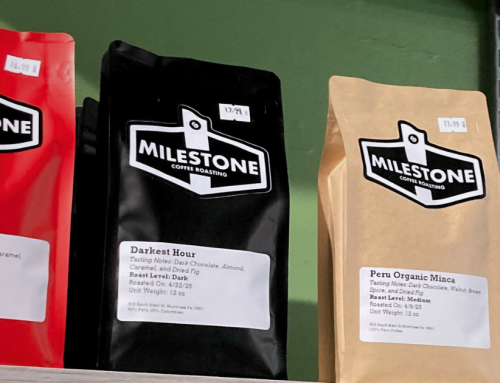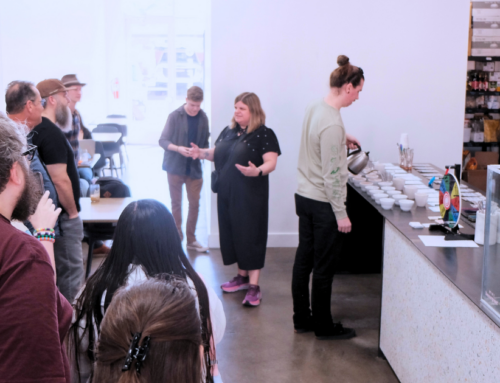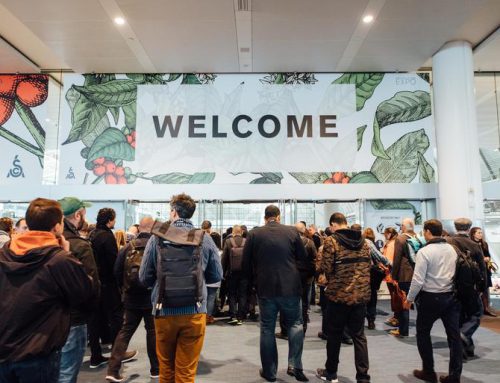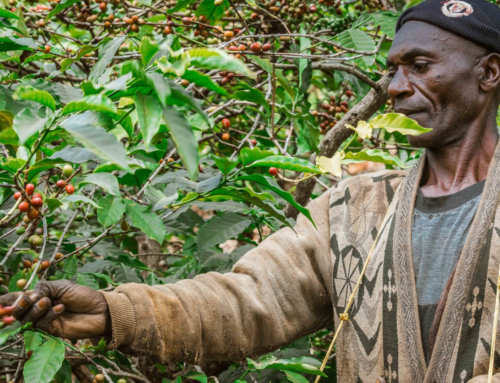Jeremy Moore says he found his taste for coffee following his parents around the coffee shops of Europe. Much later, he and his wife Erika turned their shared love of coffee into a wholesale roasting business and later also cafes. The guiding idea behind both enterprises is that it’s not enough to just serve good coffee or do a good thing, but that it’s essential to “do good while doing well.” I.e., they intend to leave things better than they found them.
This September, at the Golden Bean North America Roasting Competition, the Moores’ BonLife took home a gold medal, in the Organic Espresso competition. Moore says he was initially hesitant to try Genuine Origin, but the process — and the coffees — won him over. Recently, he roasted two GO coffees and agreed to share his roasting notes, and his thoughts. (ps: Read to the end — you’ve got Jeremy to thank for a Tanzania special!)
By Jeremy Moore
A few weeks ago, I had the chance to talk with Teresa von Fuchs [GO’s head of Marketing and Sales] about sustainability, the supply chain, coffee quality and a few other things the world isn’t quite ready to see on the interwebs.
Afterward, we decided I’d try a few coffees and offer some feedback. I must say, I went in a bit skeptical, as at BonLife, we tend to focus on single-farm and single-varietal lots. But what we found were two very different but really nice community coffees that we could easily work into our lineup — plus some extra bonuses.
Before I get into the specifics, I’ve gotta share one of my favorite pieces about the Genuine Origin buying process: You can schedule delivery up to 90 days in advance, and the flat-rate UPS shipping takes a potential logistical headache out of the equation.
Another piece I thought I would like —but that really came into focus when our GO coffees arrived the same day as a pallet of Honduran 69kg bags — was the portability! After heaving 152-pound bags around, being able to grab the built-in handles on GO’s 65-pound stackable boxes was a spiritual experience!
But, you’re not here to listen to me talk about the great GrainPro-lined box sizes and ease of ordering via their well put together website… Let’s talk COFFEE!!
Coffee 1: Tanzania Mwika North
Mwika North was a nice, clean washed African coffee that stood up in the cup very nicely. We roasted it several ways, and the winner seemed to be a faster roast on our Giesen W15, dropping at the back end of 1st crack to lock in and highlight the crisp acidity and grapefruit notes that we thoroughly enjoyed in this coffee.

BonLife roasts every week in Cleveland, Tennessee. (Photo: BonLife)
If you feature pour overs or single-origin espressos, this would be a great choice to show just how bright and clean a nice African coffee can be, even when it’s not from Ethiopia or Kenya.
I roast a lot of African coffees, and I loved the naturally higher acidity that this coffee had when I sampled it. So, I went in looking to preserve and highlight that. I did a few different profiles, but this is the one I loved most:
Charge: 400F/turn at 1:40/yellow at 5:10/ 1st crack at 9/ 16% development finish just over 10:30
I found that with this profile, the Tanzania really shined and showed off its lemony acidity… YUM!
Coffee 2: Peru Chonta
This coffee was a classic. And while it’s gone for the season, GO always has a nice selection of Central/South American washed coffees with a similar profile. It was clean and sweet, with a chocolate and caramel goodness that roasted incredibly evenly. We used it as a cold brew to accentuate its natural smoothness, and it was a hit. We found taking this coffee a touch further than the Tanzania brought out the fullness of its chocolaty body.
I approached this coffee looking to highlight its sweetness and body, while hoping to catch some nuances. I know there is increasing debate on charge temps, and I’ve found this to be one of many variances that doesn’t translate well from one roasting machine to the next. Here are the two profiles I tried with this delicious coffee, which I found to be very forgiving and flexible.
#1
Charge:360F/turn at 1:50/yellow (300F) at 5:30/ 1st crack 10 minutes/ 19% development to finish just under 12 minutes
#2
Charge:430F/turn at 1:30/yellow (300F at 5:05/ 1st crack 9 minutes/ 15% development to finish around 10:30
Again, this was a very sweet, forgiving coffee that was easy to handle and took both roasts well. I found the lower charge to draw out the sweetness and body a bit more than the higher charge/faster finish. While I don’t typically go to 2nd crack, I do believe this coffee can handle it and roast well and would be a good choice if you’re looking for a coffee to take a bit darker.
Final Notes
One of my favorite things about this experience was that the cupping notes from the Genuine Origin website were spot on. Our Q grader was within 1/2 point of the GO score indicated, whereas we’ve sometimes found importer scores to be aggressively high.
The entire Genuine Origin experience, from ordering, to delivery, roasting and enjoying the finished cup was better than I expected. If you’ve been on the fence about ‘em, I’d encourage you to give a few boxes a try.
And until the end of October, they’re offering 10 percent off every coffee from Tanzania. No code needed!
Jeremy Moore is the founder of, and Chief Believer at, BonLife Coffee in Bradley County, Tennessee.






